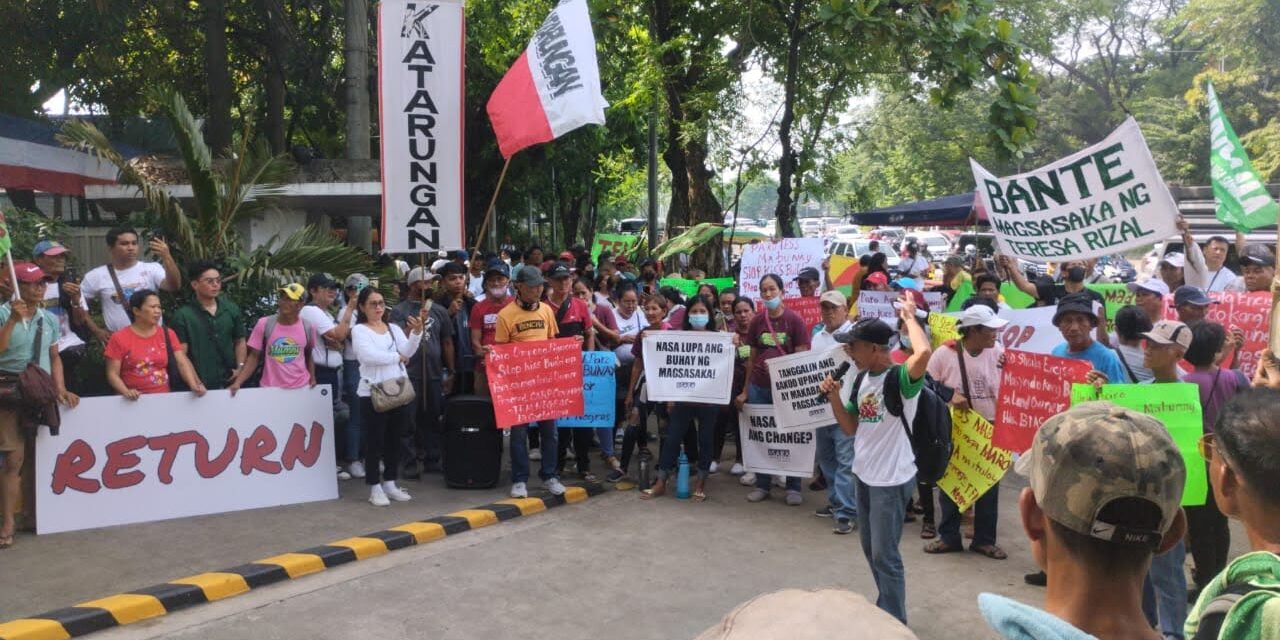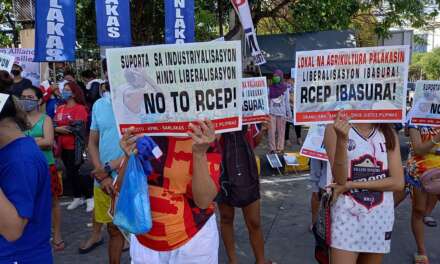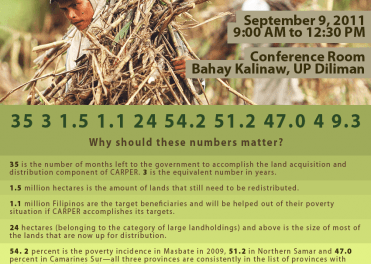On June 10th, members of the Save Agrarian Reform Alliance (SARA) joined a protest action in front of the Department of Agrarian Reform in commemoration of the 36th anniversary of the Comprehensive Agrarian Reform Program. The mobilization was meant to create a platform for farming communities to shed light on the current rural context under the Marcos administration, and share their calls for change.
The farmers attending the protest hailed from across the Philippines, and featured groups from Negros Occidental, Pampanga, Bataan, Palawan, Boracay, and Batangas. While the majority of the protestors gathered in front of DAR’s gates, at times the protest spread into the busy Quezon City circle, stopping traffic. Some communities had even camped in front of the DAR for the previous ten days due to the urgency of their agrarian struggle. While gathered, farmer speakers boldly shared stories of the injustices facing their communities, and the ways in which their communities continue to fight back. Leaders called for peasant solidarity, further struggle, and justice.
Despite projecting itself as pro-farmer, the Marcos administration’s programs on agrarian reform and agriculture are being challenged by farmers, fishers, and people’s living in rural areas. First, while the New Agrarian Emancipation Act allows many Agrarian Reform Beneficiaries to stop paying amortization to the landbank, this may primarily benefit the wealthy individuals and corporations that have consolidated ownership over lands previously distributed under CARP. Additionally, while Marcos has stated that his administration will finish distributing the remaining 500,000 hectares of agricultural land that was previously slated for distribution within his term, (thus concluding the agrarian reform program), Land Acquisition and Distribution performance has been extremely low. In 2023, only 12,254 hectares of private agricultural lands were subject to distribution, and instead, around 270,000 hectares of land previously slated for distribution have been questionably deleted. The conclusion of the agrarian reform program combined with unchecked neoliberalism will leave small-scale food providers at the mercy of large landowners and corporations, while the general public suffers from import dependence and the food crisis.
In the face of this dire situation, the mobilization had a wide range of demands articulated in a letter to DAR Secretary Estrella, and a letter to President Bongbong Marcos. The demands raised in the letter to DAR Secretary Estrella came from eleven emblematic agrarian cases, the largest of which were two haciendas formerly owned by Eduardo Cojuanco Jr., and an hacienda formerly owned by Roxas & Company, Inc. The demands raised to President Bongbong Marcos related to the agrarian reform program more generally. This letter called for (a) Congress to pass new legislation that would issue a new CARP Notice of Coverage, (b) Congress to create an independent commission to investigate redistribution schemes that are designed to allow the original land owner to maintain control (including Voluntary Land Transfers, exemptions, collective CLOAs, agribusiness venture arrangements, illegal and premature conversions, over-retentions, and reversals), (c) investment in farmers’ skills and the provision of support services, and (d) law enforcement to orient itself towards protecting the lives, property, and rights of farmers against threats from goons and private security hired by former landowners.
Save Agrarian Reform Alliance (SARA), represented by SANAMABASU (a farmers organization pushing for the implementation of agrarian reform in Barangay Sumalo, Hermosa, Bataan), focused on how lawsuits are being weaponized to suppress land rights. The group’s four main calls were for (a) DAR to effectively implement agrarian reform in a timely manner, especially in areas where peasant/farmer land rights are suppressed, so as to reduce peasant/farmer exposure to legal, physical, and economic violence, (b) the Legislature to pass laws to protect land rights defenders from Strategic Lawsuits Against Public Participation and other forms of violence, (c) the Judiciary to take special consideration for cases that might be agrarian in nature, and introduce policy/procedural safeguards that prevent lawfare and legal abuse against peasants/farmers pushing for agrarian reform, and (d) the Malacanang to make agrarian reform a priority when addressing the food crisis, rural hunger and poverty, and the nation’s capacity for food self-sufficiency and food sovereignty.
The mobilization drew the attention of a number of reporters, and resulted in the DAR agreeing to send an undersecretary to meet with the leaders of the various groups. However, the undersecretary never made an appearance.
While the government, and particularly the Marcos administration, may aim to foster a pro-farmer image, rural food producing communities continue to struggle under a neoliberal system rigged in favor of powerful corporations and landowners. However, peasant mobilizations like the CARP anniversary mobilization demonstrate that affected communities are not accepting this passively, and continue to build strength, unity, and awareness in their fight for justice.










